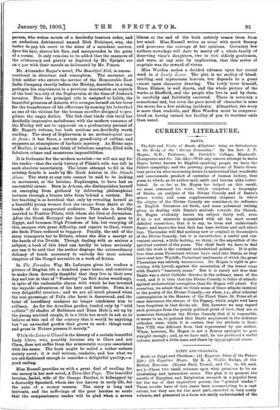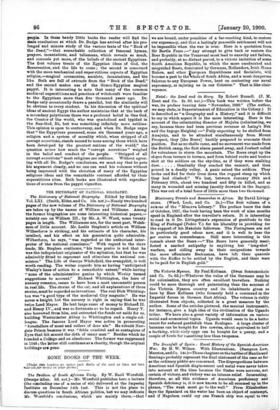EGYPT AND CHALDAEA.
Books on Egypt and Cha/daea : (I) Egyptian Ideas of the Future Life ; (2) Egyptian Magic. By E. A. Wallis Budge, of the British Museum. (Kegan Paul, Trench, and Co. 3s. 6d. each net.)—These two small volumes open what promises to be an interesting and instructive series. The plan is to present the results of Egyptian and Babylonian research in a popular form for the use of that inquisitive person, the "general reader." These results have of late years been accumulating to a vast extent, but they are, for the most part, recorded in very costly volumes, and presented in a form not easily understanded of the pm*. In these handy little books the reader will find the main conclusions at which Dr. Budge has arrived after his pro- longed and minute study of the various texts of the "Book of the Dead,"—that remarkable collection of funereal hymns, prayers, incantations, and talismans, which reveals so much, and conceals yet more, of the beliefs of the ancient Egyptians. The first volume treats of the Egyptian ideas of God, the Resurrection, and the life to come ; the second is concerned with the more mechanical and superstitious aspects of Egyptian religion,—magical ceremonies, amulets, incantations, and the like. Both are full of extracts from the " Book of the Dead," and the second makes use of the Grteco-Egyptian magical papyri. It is interesting to note that many of the common mediteval superstitions and practices of witchcraft were familiar to the Egyptians more than five ' thousand years ago. Dr. Budge only occasionally draws a parallel, but the similarity will be obvious to every student. In his discussion of the spiritual ideas of ancient Egypt the author maintains that at the back of a secondary polytheism there was a profound belief in One God, the Creator of the world, who was symbolised and typified in the Sun-God, Rh, but was something infinitely more sublime. This opinion is open to controversy, and when Dr. Budge urges that "the Egyptians possessed, some six thousand years ago, a religion and a system of morality which, when stripped of all corrupt accretions, stands second to none among those which have been developed by the greatest nations of the world," the question arises how much the "corrupt accretions" weighed in the belief and conduct of the people. "Stripped of all corrupt accretions" most religions are sublime. Without agree- ing with all Dr. Budge's conclusions, we must say that he puts his argument clearly, and no one can read his volumes without being impressed with the elevation of many of the Egyptian religious ideas and the remarkable contrast afforded by their superstitious rites. Both books are illustrated with reproduc- tions of scenes from the papyri vignettes.







































 Previous page
Previous page